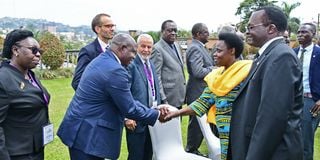Prime
Museveni tips African chief justices on case settlement

President of the East African Court of Justice Nestor Kayobera shakes hands with Vice President Jessica Alupo as Chief Justice Alfonse Owiny- Dollo (right) looks on at the opening of the Africa Chief Justices’ Summit in Kampala on March 5, 2024. PHOTO/ABUBAKER LUBOWA
What you need to know:
- The President says the African way of resolving conflicts leads to truth-telling unlike the current formal justice system.
- The Chief Justice said if the ADR is fully adopted in Uganda, the current case backlog standing at over 43,000 cases will drastically go down. The two-day summit is running under the theme: “Reengineering the Administration of Justice on the African continent.”
President Museveni has applauded the African chief justices on their bid to revert to resolving disputes the African way.
The President reasoned that the African way of resolving conflicts such as mediation and reconciliation led to truth-telling unlike the current formal justice system that covers the truth upon hiring a lawyer.
“I am happy that our judiciaries [African judiciaries] are realigning themselves with their African roots. The pre-colonial methods of handling disputes must be studied and they have some positive elements in them that the present legal system must emulate. One of the core principles of African jurisprudence was truth finding, this differs from the current legal system, which we inherited from the British,” Mr Museveni said in his remarks read out by Vice President Jessica Alupo on Tuesday.
Adding: “In the current system, one hires an advocate to cover his or her mistakes in a courtroom. The lawyer’s job is to minimise his client’s mistakes and maximise his innocence. He is paid to obscure the truth after all attempts to arrive at the truth…”
The President’s call was made during the opening of the Africa Chief Justices Summit on Alternative Dispute Resolution (ADR) in Kampala, which drew more than 15 chief justices from all over Africa.
To drive his point home, Mr Museveni gave an example of how the Banyankole harmoniously handled marital disputes.
“In this Banyankole system, even your side would turn against you, upon discovering that you are a wrongdoer. For instance, if the woman was in the wrong, her own family would turn against her and order her to apologise to her husband. That was one of our principles. It was based on truth, rather than just legal battles. We did not cover up the truth,” he said.
He promised to support Uganda’s Judiciary to embrace ADR.
“Government will support the Judiciary to expand the use of alternative dispute resolution. This will help to rejuvenate the traditional systems of dispute resolution,” he said.
Appeal
Speaking at the same summit, Chief Justice Alfonse Owiny-Dollo rallied his colleagues in attendance to encourage their courts to adopt the concept of settling disputes the African way, which, he said, is quick and cheap.
Justice Dollo said studies by Ernest Uwazie established that many African citizens have lost faith in the ability of their nations’ courts to provide timely or just closure to their grievances.
“The primary object of the ADR movement is avoidance of vexation, expense, and delay and promotion of the ideal of ‘access to justice’ for all. The ADR system seeks to provide cheap, simple, quick, and accessible justice….. So, precisely saying, ADR aims at providing justice that not only resolves disputes but also harmonises the relationships of the parties,” Justice Dollo said.
He added: “You will agree with me that native customs provided very satisfactory dispute resolution approaches that were people-centred and that left the community members largely satisfied. This is what we missed when we popularised the formal Court adjudication system at the expense of our African dispute settlement approaches.”




